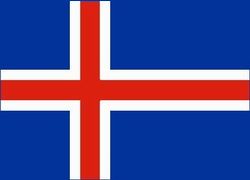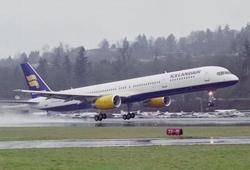Airline Joins Exclusive 'We Made Money' Club
 Icelandair's rapid cost-cutting maneuvers and
stepped-up penetration of key markets in the post-September 11th
aviation marketplace were cited as major contributions leading to
increased profits for the airline and its parent company Flugleidir
for FY2002, according to an announcement from Icelandair's Head
Office in Reykjavik.
Icelandair's rapid cost-cutting maneuvers and
stepped-up penetration of key markets in the post-September 11th
aviation marketplace were cited as major contributions leading to
increased profits for the airline and its parent company Flugleidir
for FY2002, according to an announcement from Icelandair's Head
Office in Reykjavik.
"Icelandair employees have worked as a team on the changes that
needed to be made to its operations," said Sigurdur Helgason,
President and CEO, "securing a major turnaround in the operation,
which is crucial for shareholders and for employees, and laying a
firm foundation for the company's future."
In response to the team effort, Flugleidir awarded each employee
in the workforce of more than 2,000 worldwide with shares of the
company's stock, currently valued at ISK 50,000 (about $550
US).
 Over the years, Icelandair's success in the
international marketplace has been based on a few key elements that
run like a common thread through the company's history. These
include freedom of competition and access to markets, the creation
of an operating environment that ensures the flexibility necessary
to adapt to changing external conditions, an educated management
and workforce, and a corporate culture that is open to new
opportunities and that encourages its employees to exploit
them.
Over the years, Icelandair's success in the
international marketplace has been based on a few key elements that
run like a common thread through the company's history. These
include freedom of competition and access to markets, the creation
of an operating environment that ensures the flexibility necessary
to adapt to changing external conditions, an educated management
and workforce, and a corporate culture that is open to new
opportunities and that encourages its employees to exploit
them.
The events of September 11, 2001, however, provided a telling
lesson in how external events can affect Icelandic business,
communications, and the nation's way of life.
Earlier that Fall, Icelandair had implemented a strategic plan
designed to tackle the problems faced in international aviation
operations due to weak markets and the unfavorable development of
various peripheral operational factors.
How they did it:
Although the airline's roots lay in the buildup of operations,
several things contributed to the overall turnaround after
September 11. All international flight services had been
transferred to a single model of aircraft, new employee contracts
were already in place and organizational reforms were well in
progress.
 By pulling out of unprofitable
markets and focusing on cutting costs in
all operating units, as well as emphasizing sales to Iceland,
Icelandair ultimately proved better prepared than many other
airlines in Europe and North America.
By pulling out of unprofitable
markets and focusing on cutting costs in
all operating units, as well as emphasizing sales to Iceland,
Icelandair ultimately proved better prepared than many other
airlines in Europe and North America.
"The United States/Canada is a very important market for
Icelandair, providing a substantial share of the company's overall
ticket revenues in 2002," said Gunnar Eklund, Icelandair's General
Manager - The Americas. "In addition to meeting our overall revenue
expectations, other key objectives were also well achieved, in
spite of the difficult market conditions for transatlantic travel.
It is particularly encouraging to note that destination Iceland was
much less affected by the 2002 market situation, resulting in
similar revenues from the United States/Canada to Iceland as in the
years 2000 and 2001." This, he said, was despite substantial
capacity reductions in some months.
Icelandair's Helgason described the turnaround in operations in
2002 as unique in the company's history. "Had the development of
the country's air transport system been dictated solely by global
market forces," Helgason said, "Iceland would be treated as a
far-flung outpost of a major international carrier, which might
provide flights once or twice a day to a hub of its choice." He
added, "Icelandair's size and flexibility enabled the company not
only to deal with sudden changes but also to achieve significant
reductions in operating costs without affecting our travel
operation or services to our home market."
 In the
years that have passed since Icelandair made the transition from
airline to full-service travel operator, tourism to Iceland
has grown almost beyond recognition. From 1993 to 2000,
the number of visitors to the country doubled, while foreign
currency earnings from tourism rose by almost 40%.
In the
years that have passed since Icelandair made the transition from
airline to full-service travel operator, tourism to Iceland
has grown almost beyond recognition. From 1993 to 2000,
the number of visitors to the country doubled, while foreign
currency earnings from tourism rose by almost 40%.
Icelandair's primary focus in future strategies is to cut costs
at all operating units and, above all, in international aviation.
Work is also under way to boost revenue formation in international
flight services by increasing the proportion of passengers to and
from Iceland and reducing the share of North Atlantic operations in
total traffic.
 Aero-News: Quote of the Day (12.07.25)
Aero-News: Quote of the Day (12.07.25) ANN's Daily Aero-Linx (12.07.25)
ANN's Daily Aero-Linx (12.07.25) NTSB Final Report: Lafferty Jack Sea Rey
NTSB Final Report: Lafferty Jack Sea Rey Classic Aero-TV: The B29 SuperFortress Doc - History in Flight
Classic Aero-TV: The B29 SuperFortress Doc - History in Flight Airborne 12.08.25: Samaritans Purse Hijack, FAA Med Relief, China Rocket Fail
Airborne 12.08.25: Samaritans Purse Hijack, FAA Med Relief, China Rocket Fail






